Case Sharing of the 2025 IIOE Pioneer Award ③

The "BGI Group · 2025 IIOE Digital Higher Education Digitalisation Pioneer Case Award" (hereinafter referred to as the "Pioneer Award") has officially announced its winners. Since its launch, the award has garnered wide attention, receiving 66 valid submissions from 29 countries around the world. A total of 22 outstanding cases from Asia, Africa, and Latin America stood out, including 12 from overseas higher education institutions, 4 from Chinese universities, and 6 from enterprises.This year, one of the world's leading life science and genomics organizations, BGI Group and BGI College, sponsored the IIOE Pioneer Case Award. BGI Group and BGI College are dedicated to life science and genomics research, and cultivate talents for the field. The sponsorship has demonstrated its remarkable support in bringing equitable higher education.
In this edition, we introduce five outstanding cases in Category 2: Enabling Localised Digital Empowerment Initiatives through IIOE National Centres.
What is IIOE National Centre?
IIOE selects flagship universities in key partner countries with a foundation of long-term collaboration to jointly establish IIOE National Centres, with the aim of enhancing local implementation of the initiative. These National Centres serve as national hubs for teacher training, digital learning, higher education, and digital transformation, and are often endorsed by the relevant government authorities (such as ministries of higher education). To date, UNESCO-ICHEI has established IIOE National Centres in 13 universities across Asia and Africa, forming country-specific networks of local higher education institutions. IIOE National Centres are responsible for expanding the IIOE network within their countries and coordinating IIOE initiatives, such as online training courses, joint curriculum development, country-specific collaborative research, and organizing national-level events.
Case 1 Digital Empowerment of Educators and Students through IIOE National Centre Pakistan
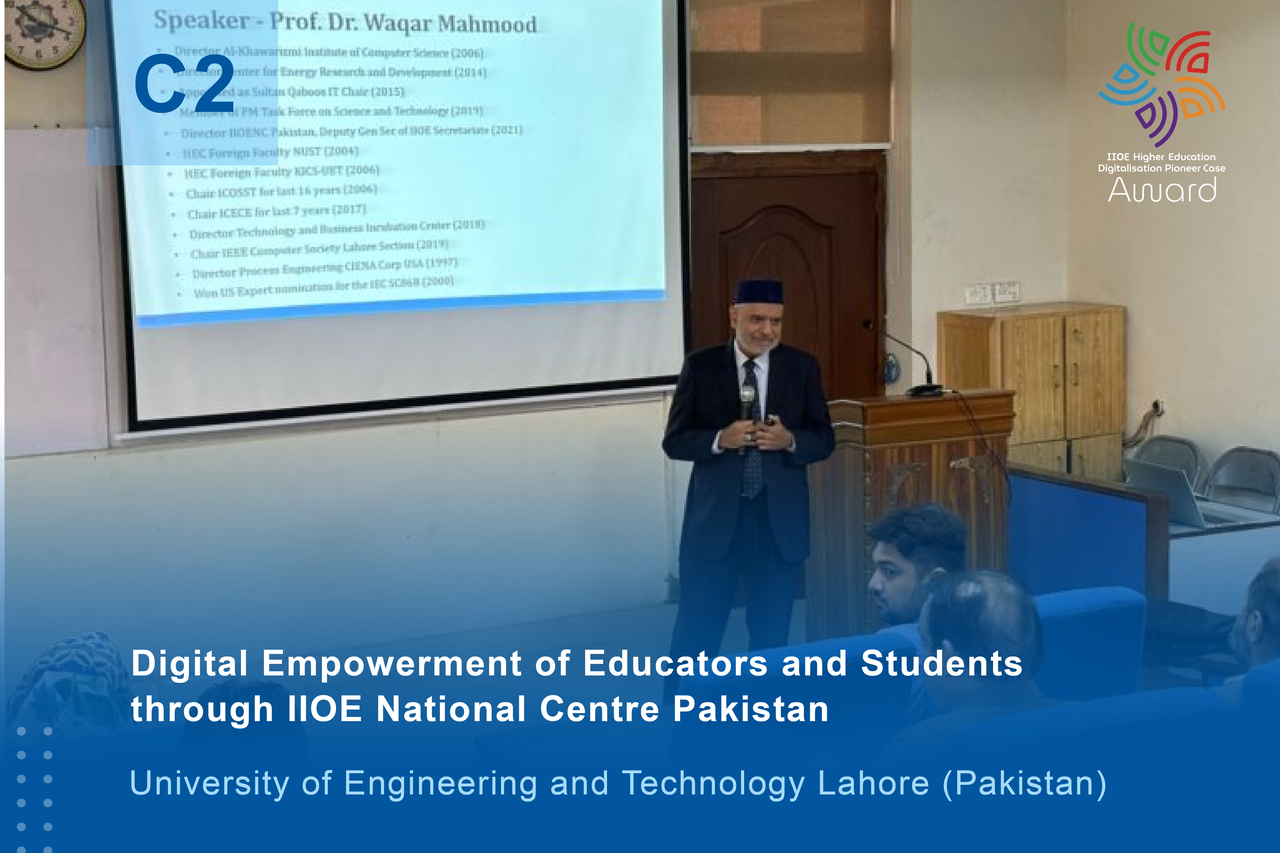
Project Background
Systemic gaps, arising from uneven internet penetration, low levels of digital literacy among teachers and students outside major cities, and insufficient use of digital tools in teaching, have constrained Pakistan’s progress toward achieving the United Nations Sustainable Development Goal 4 (Quality Education). To bridge these gaps, the University of Engineering and Technology Lahore (UET Lahore), building on the IIOE Pakistan National Centre established in 2021, has localized IIOE resources, supported partner universities in developing digital content, and provided targeted professional development training in areas such as artificial intelligence and machine learning. With the backing of international collaboration, national policy support, and partnerships with provincial higher education commissions, UET Lahore, through the IIOE Pakistan National Centre, is working to advance digital empowerment for teachers and students in Pakistan’s education sector.
Project Implementation
UET Lahore’s teacher and student empowerment initiatives are rooted in long-term international cooperation and the outreach capacity of the IIOE Pakistan National Centre. First, the Huawei Authorized Information and Network Academy (HAINA), established with UET Lahore, has continued to cultivate talent in Pakistan proficient in modern information and communication technology (ICT) and telecommunications, with Huawei ICT certifications empowering both students and professionals. Second, UET Lahore has actively leveraged the outreach role of the IIOE Pakistan National Centre. In collaboration with provincial higher education commissions, UET Lahore has brought institutions such as the University of Education Lahore and Lahore College for Women University into the IIOE network. It then selected relevant courses from the IIOE global resource pool, which covers topics such as artificial intelligence, cloud computing, and digital literacy for academic design. Through diversified funding channels, including alumni networks and national support, the university successfully organized bootcamps, webinars, and workshops.
Project Outcomes
By the practices of the IIOE Pakistan National Centre, UET Lahore has not only strengthened the digital competencies of educators and students but also designed a micro-certificate course for IIOE based on its experience. To date, the project has developed 10 advanced courses and delivered them through over 50 key training sessions, forming a replicable localized capacity-building system. More than 800 students and 300 teachers have been trained, with female participation reaching 60% in student programs. Moreover, the project has established a scalable model that offers valuable lessons for Pakistan’s higher education digital transformation, with a strong focus on creating real economic opportunities for students. Participants have collectively earned more than 300 international certifications in digital skills fields such as artificial intelligence and web development.
Jury's Comments: The project, grounded in the positive impact of enhancing digital literacy on Pakistan’s economy and higher education, has seen the IIOE Pakistan National Centre actively localize resources, engage in policy research, and secure government support, demonstrating outstanding leadership.
Case 2 Enabling Localised Digital Empowerment Initiatives through IIOE National Centres
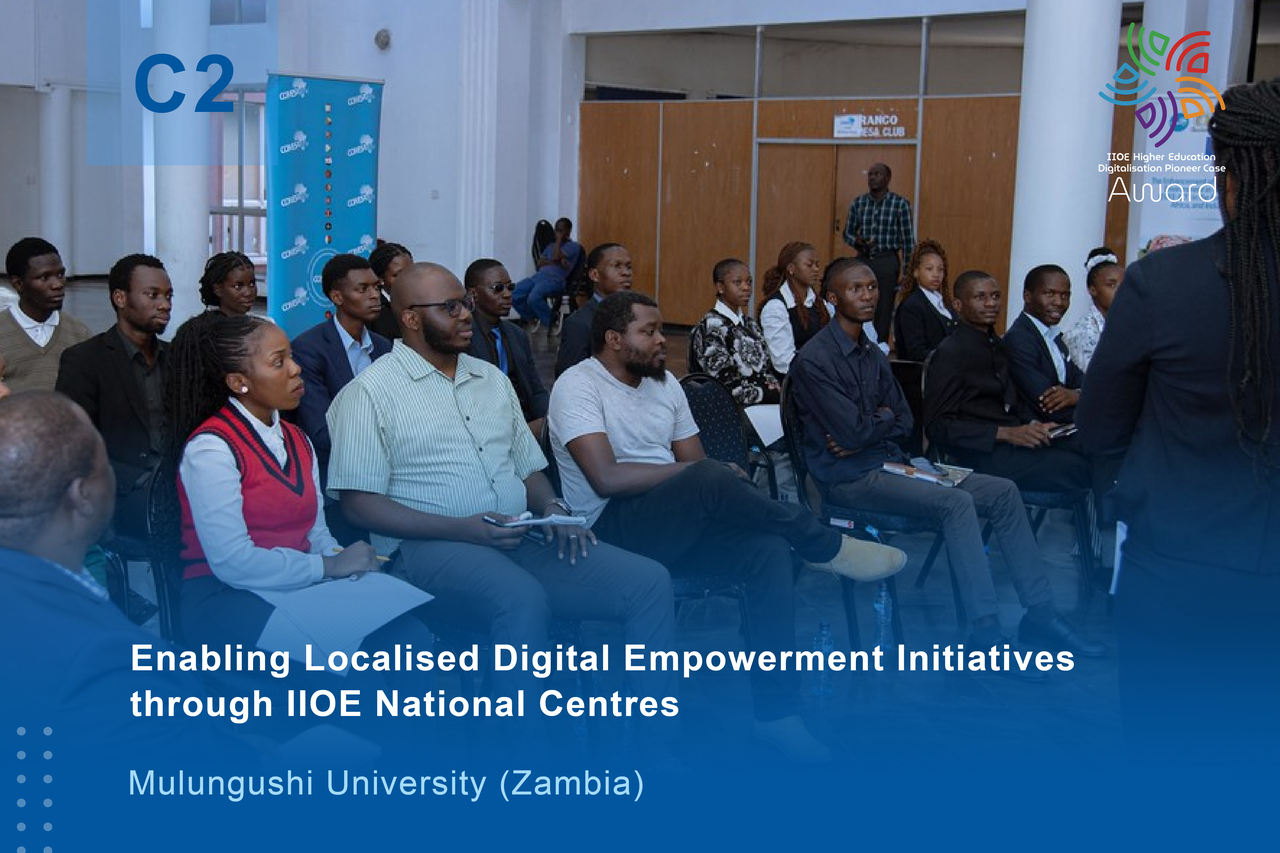
Project Background
Zambian Higher Education Institutions(HEIs) today face both the opportunities and challenges brought by generative artificial intelligence technologies, alongside the widening gap within the country’s higher education system. Through the IIOE Zambia National Centre, Mulungushi University (MU) has implemented a series of initiatives including policy leadership, industry engagement, and network expansion within the IIOE framework. These measures aim to enhance workforce skills, achieve regional replicability, and ultimately facilitate a smooth digital transformation of higher education.
Project Implementation
MU adopted a four-phase strategy comprising institutional capacity building, network expansion, policy leadership, and industry integration to directly link IIOE flagship courses with workforce skills development and employability. In the first phase, leveraging two IIOE flagship courses, MU provided all teaching staff with knowledge on AI teaching techniques and in-depth educational exploration to strengthen institutional capacity. In the second phase, the project expanded to other institutions, with the IIOE Zambia National Centre enrolling ten higher education institutions and inviting their educators to take the same flagship course training. These courses were further enriched with localized Zambian content and on-site technical support. In the third phase, MU and its partner institutions organized high-level summits and participated in AI policy and strategy roundtable discussions to ensure alignment between institutional and policy levels. Finally, in the fourth phase, the project integrated domestic and international enterprises, such as BongoHive and Huawei, into its activities to support students with hands-on practice, mentorship, and industry certifications.
Project Outcomes
Through targeted interventions, strategic partnerships, and policy engagement, the IIOE Zambia National Centre at MU has achieved significant results in advancing Zambia’s higher education digital transformation. Over 110 educators from MU and partner institutions have completed the relevant course training, with participants reporting a 92% increase in confidence in using AI for teaching, learning, and assessment. Collaboration with Huawei has enabled more than 300 students to earn certifications in areas such as artificial intelligence, the Internet of Things (IoT), and cloud computing, enhancing industry relevance and employability. The project’s proactive policy coordination and high-level collaboration also led the Zambian Ministry of Education to officially authorize the IIOE Centre to coordinate the drafting of the National AI in Education Policy, laying the groundwork for a unified national educational AI framework.
Jury's Comments: The IIOE Zambia National Centre, in collaboration with over 10 higher education institutions, has created a truly synergistic cooperation system and gained strong support from local higher education authorities, demonstrating the influence of the National Centre.
Case 3 Organization of Training Courses on AI and Scientometry for Librarians of Uzbekistan with the Help of the National IIOE Centre
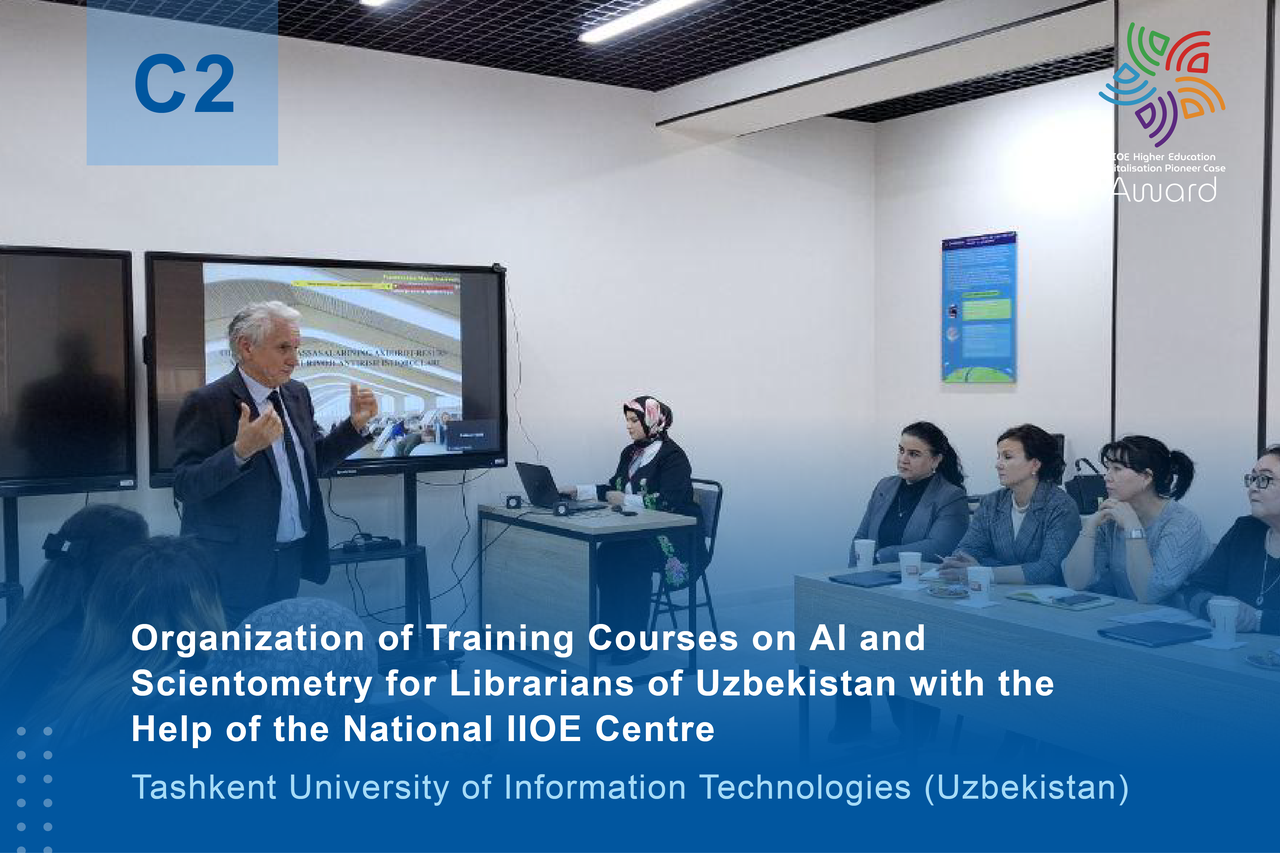
Project Background
In 2024, Uzbekistan established the Institute for Retraining and Advanced Training of Higher Education Personnel (IRAT-HE). Then, the government allocated funding to provide national subscriptions for high-quality research and educational electronic resources from internationally renowned companies and publishers to universities across the country. To promote digital training for educators, enhance their effective use of digital educational resources, and advance the digital transformation of higher education, Uzbekistan’s higher education system faces the urgent task of leveraging advanced information technologies to provide information support for teachers, students, and researchers. In response, Tashkent University of Information Technologies (TUIT), through the IIOE Uzbekistan National Centre, aims to provide training to university librarians and key experts covering artificial intelligence applications, use of global electronic information resources, and scientometric analysis methods.
Project Implementation
The project is implemented with joint support from IRAT-HE and TUIT. IRAT-HE coordinates all training programs by issuing official recommendations for advanced library staff courses, coordinating schedules with the IIOE Uzbekistan National Centre at TUIT, supervising and managing course delivery, and organizing participant assessments. Currently, IRAT-HE collaborates with over 200 universities nationwide to enhance the professional capacity of academic library staff. Besides, the IIOE Uzbekistan National Centre at TUIT co-develops training curricula and schedules. Each session trains 30–40 participants, primarily targeting academic library directors, department heads, and key personnel, with courses conducted in classrooms at the IIOE National Centre. During this process, TUIT surveys core digital skill needs, provides technical and equipment support to the IIOE National Centre, and collaborates with university libraries, EdTech companies, government, and public and commercial institutions to ensure resource support.
Project Outcomes
The project has comprehensively enhanced the skills of academic library staff in artificial intelligence, scientometrics, and World Information Resources (WIR) by developing new courses on AI applications, WoS and Scopus data analysis, and the use of electronic research and educational resources, and integrating them into IRAT-HE’s continuing education system. Through the technical infrastructure and software of TUIT’s IIOE Uzbekistan National Centre, participants gained access to resources from internationally renowned publishers, as well as analytical systems. Training leveraged TUIT’s teaching materials and faculty from the Department of Information and Library Systems, reaching over 240 participants. As a result, universities in Uzbekistan have seen significant improvements in scientometric indicators, quality of information services, and user satisfaction, along with increased publication activity, greater application of AI in retrieval and services, and expanded readership. The project has optimized library and information workflows, elevated information literacy, and modernized the professional competencies of library staff by incorporating advanced practices from developed countries, fostering international standards in library services.
Jury's Comments: The IIOE Uzbekistan National Centre is actively engaging local university experts in training and participating in national policy discussions, advancing the important agenda of integrating artificial intelligence into higher education.
Case 4 Fostering Excellence in Digital Education, Role of IIOE Egypt Centre

Project Background
Since 2019, Ain Shams University (ASU) has collaborated with the UNESCO International Centre for Higher Education Innovation (UNESCO-ICHEI) to advance the digital transformation of higher education teaching. This effort has since expanded from ASU to encompass universities across Egypt. To realize this, ASU partnered with the International Institute of Online Education (IIOE) to establish the IIOE Egypt National Centre. The IIOE National Centre has implemented a series of initiatives, including launching and supporting micro-credential programs, organizing collaborative dialogues and meetings with partners, developing online courses, and conducting virtual mobility projects to enhance digital competencies for both faculty and students. These initiatives aim to build a nationwide network of HEIs, promote the implementation of online and blended learning across Egypt, establish a national dialogue platform to support professional development for university faculty and staff, collaboratively develop online courses aligned with Egypt’s national needs, advance research on higher education digital transformation, and foster local partnerships with the education industry.
Project Implementation
The IIOE Egypt National Centre at ASU was designed using a structured, multi-phase, adaptive, and stakeholder-driven approach to ensure alignment with national priorities and the specific needs of Egyptian HEIs. The project integrates a national partner network, localized IIOE implementation frameworks, professional development platforms, policy alignment and stakeholder engagement mechanisms, and strategic industry partnerships to support sustainable digital transformation.
Based on institutional needs assessments, ASU piloted initiatives to empower digital teaching and learning in Egyptian universities, co-developed a nationally scalable “Student ICT” course, and promoted international collaboration projects. ASU established an Egypt-specific hub, developed four courses tailored to both global and local needs, provided registration and technical support, and incentivized faculty participation through a micro-certification excellence award incorporated into mandatory professional development for promotion. Additionally, ASU established a national dialogue platform to facilitate regular inter-university exchange and collaboration, while policy alignment mechanisms ensure that project outcomes feed into the national higher education development strategy. These initiatives collectively provide a systematic approach to advancing the digital transformation of higher education in Egypt.
Project Outcomes
Building on a robust framework, the IIOE Egypt National Centre has established formal collaborations with 21 public universities, 2 national universities, 1 private university, as well as key government bodies, EdTech companies, and professional associations. In terms of resource development, the IIOE Egypt National Centre offers over 20 micro-credential courses. For capacity building, the Centre conducted the “Digital Teaching Capacity Enhancement for Egyptian HEIs” pilot, training 62 faculty members to strengthen digital teaching and learning skills.
To date, six Egyptian universities have adopted the jointly developed “ICT for Students” course. Additionally, ASU has trained over 1,135 educators through customized micro-credential programs, enhancing their Outcome-Based Teaching and Learning (OBTL) capabilities. Through training, policy dialogues, co-created projects, and cross-border collaboration, ASU has strengthened network cohesion and optimized platform functionality. Furthermore, ASU has integrated micro-credential courses and quality assurance frameworks into national teacher development policies and certification standards, aligning the “ICT for Students” course with institutional requirements.
Jury's Comments: The IIOE Egypt National Centre has actively advanced digital teaching and the application of artificial intelligence technologies, while organizing national-level high-level policy dialogue sessions, demonstrating the vitality of the local network and the deep integration of localized courses.
Case 5 A National Dialogue Iinitiative: Consensus Framework towards a Policy/Guidelines Roadmap for Nigerian Higher Education in the Age of Artificial Intelligence
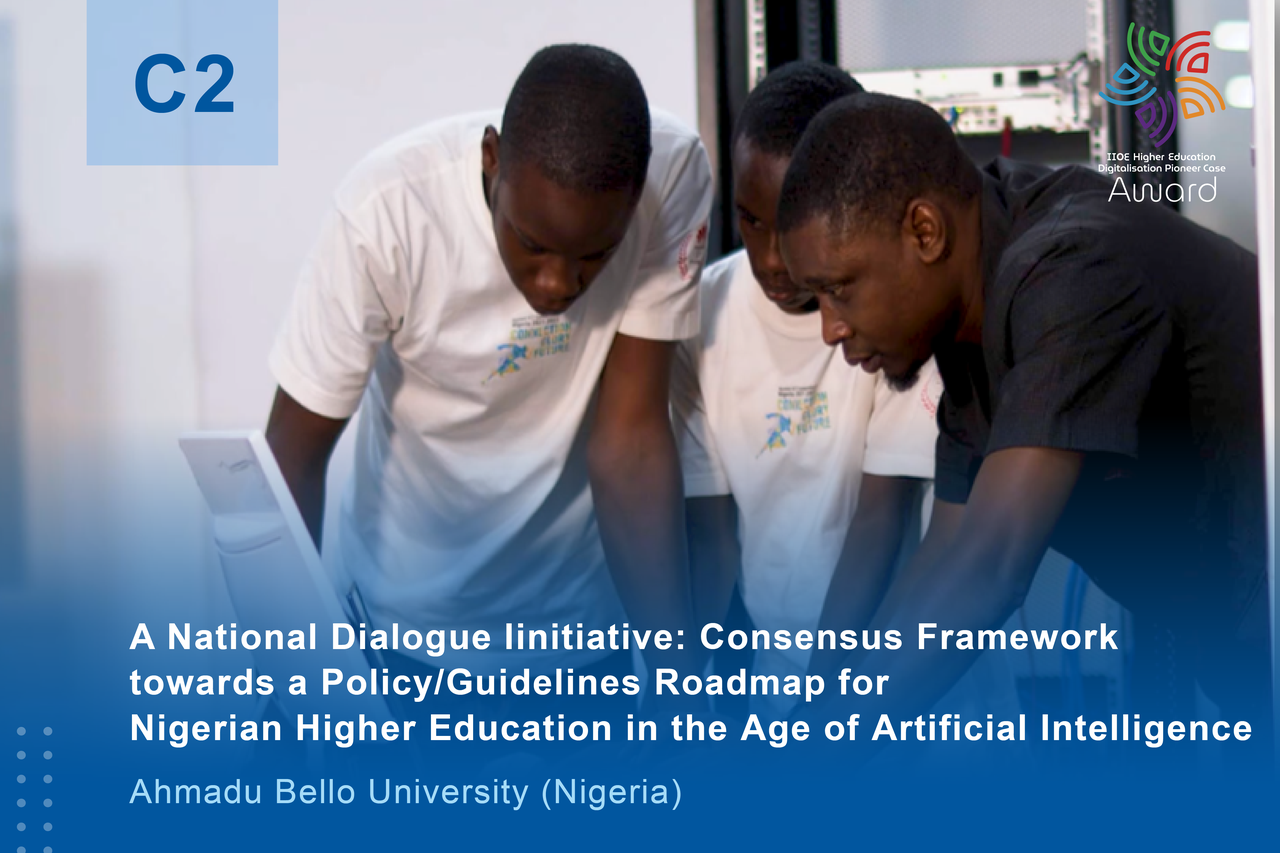
Project Background
Currently, Nigeria lacks national or institutional regulatory frameworks for artificial intelligence, making it crucial to develop AI-related capacities within policy structures to understand its possibilities, limitations, and risks. This also facilitates interdisciplinary and cross-sector discussions to establish consensus on responsible, ethical, and safe AI use, while addressing infrastructure, training, interdisciplinary research, and digital divide challenges. Thus, the IIOE Nigeria National Centre, in collaboration with Ahmadu Bello University(ABU), UNESCO-ICHEI, and IIOE, organized a national dialogue in Abuja on July 18, 2024. The event brought together policymakers, educators, researchers, industry experts, corporate partners, and students to explore AI applications in higher education. The dialogue aimed to develop a consensus-based policy framework to guide Nigerian higher education institutions in the innovative and safe use of AI, empowering policymakers, educators, and learners to maximize AI’s potential in teaching, learning, and research.
Project Implementation
Prior to the national dialogue, ABU hosted an institutional dialogue on “Generative Artificial Intelligence and Higher Education” on November 28, 2023, providing a platform for comprehensive discussion of the impacts, challenges, risks, and opportunities of generative AI tools and technologies. The event brought together administrators, faculty, and students through keynote presentations and interdisciplinary panel discussions. The institutional dialogue focused on themes such as responsible, ethical, and safe AI use in higher education, AI applications in teaching, learning, and research, interdisciplinary collaboration, ethical frameworks, skills gaps and workforce preparedness, faculty capacity building and training, infrastructure needs, and cybersecurity challenges, aiming to develop actionable policy guidance for AI in Nigerian higher education.
Subsequently, with support from UNESCO-ICHEI and IIOE, the IIOE Nigeria National Centre organized the national dialogue, showcasing IIOE micro-certification programs. The dialogue convened representatives from the Federal Ministry of Education and Communications, university leadership, regulatory bodies, industry, and students to discuss AI policy, curriculum development, ethical governance, faculty professional development, and digital skills enhancement in higher education. Interactive sessions facilitated roundtable discussions, generating recommendations and consensus to inform national AI policies and practices for Nigerian higher education.
Project Outcomes
The main outcomes of the national dialogue included providing policymakers with recommendations to support AI integration in higher education, developing guidelines for responsible, ethical, and safe AI use, identifying key opportunities, resources, and challenges for AI adoption, and establishing a stakeholder network for ongoing collaboration. These outcomes contributed to the development of the Nigeria Higher Education AI Framework (Draft), designed to offer a strategic roadmap for policymakers, educators, and stakeholders to guide the ethical, responsible, and effective use of AI in higher education. The framework was developed by compiling all speeches and reports into a “Keynotes and Reports Compilation,” followed by drafting by a dedicated committee and soliciting stakeholder feedback through online documents and discussions. With stakeholder collaboration, the draft was finalized and submitted to the Nigerian Federal Ministry of Education via the National Universities Commission.
Jury's Comments: The IIOE Nigeria National Centre has implemented a range of integrated activities targeting faculty capacity building, policy development, and research, supporting the exploration of integrating artificial intelligence and emerging technologies into higher education. By hosting institutional dialogues on “Generative Artificial Intelligence and Higher Education,” the Centre has fostered consensus on AI applications among institutions, demonstrating its positive local impact.
The above are some outstanding practice cases in Category 2: Enabling Localised Digital Empowerment Initiatives through IIOE National Centres of this year's Pioneer Award. These cases demonstrate how higher education institutions in different countries leverage their national IIOE centres to achieve localized digital empowerment, providing valuable insights for the digital transformation of higher education globally, particularly in terms of context-specific practices. In the next issue, we will introduce cases from Category 3: Leveraging Smart Classroom Operations for Teaching and Learning Innovation and Excellence. Please stay tuned for the subsequent updates in the coming weeks!


